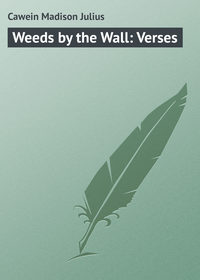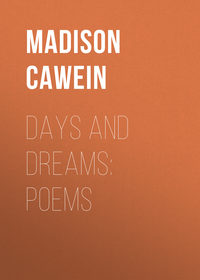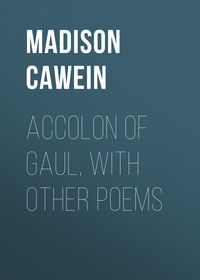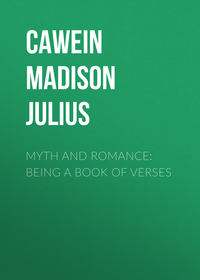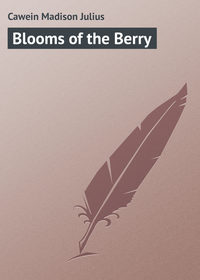Poems
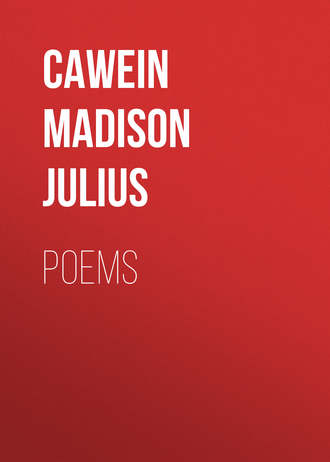 полная версия
полная версияPoems
Жанр: зарубежная поэзиязарубежная классиказарубежная старинная литературастихи и поэзиясерьезное чтениеcтихи, поэзия
Язык: Английский
Год издания: 2018
Добавлена:
Настройки чтения
Размер шрифта
Высота строк
Поля
ELUSION
I My soul goes out to her who says, "Come, follow me and cast off care!" Then tosses back her sun-bright hair, And like a flower before me sways Between the green leaves and my gaze: This creature like a girl, who smiles Into my eyes and softly lays Her hand in mine and leads me miles, Long miles of haunted forest ways.II Sometimes she seems a faint perfume, A fragrance that a flower exhaled And God gave form to; now, unveiled, A sunbeam making gold the gloom Of vines that roof some woodland room Of boughs; and now the silvery sound Of streams her presence doth assume— Music, from which, in dreaming drowned, A crystal shape she seems to bloom.III Sometimes she seems the light that lies On foam of waters where the fern Shimmers and drips; now, at some turn Of woodland, bright against the skies, She seems the rainbowed mist that flies; And now the mossy fire that breaks Beneath the feet in azure eyes Of flowers; now the wind that shakes Pale petals from the bough that sighs.IV Sometimes she lures me with a song; Sometimes she guides me with a laugh; Her white hand is a magic staff, Her look a spell to lead me long: Though she be weak and I be strong, She needs but shake her happy hair, But glance her eyes, and, right or wrong, My soul must follow—anywhere She wills—far from the world's loud throng.V Sometimes I think that she must be No part of earth, but merely this— The fair, elusive thing we miss In Nature, that we dream we see Yet never see: that goldenly Beckons; that, limbed with rose and pearl, The Greek made a divinity:— A nymph, a god, a glimmering girl, That haunts the forest's mystery.WOMANHOOD
I The summer takes its hue From something opulent as fair in her, And the bright heaven is brighter than it was; Brighter and lovelier, Arching its beautiful blue, Serene and soft, as her sweet gaze, o'er us.II The springtime takes its moods From something in her made of smiles and tears, And flowery earth is flowerier than before, And happier, it appears, Adding new multitudes To flowers, like thoughts, that haunt us evermore.III Summer and spring are wed In her—her nature; and the glamour of Their loveliness, their bounty, as it were, Of life and joy and love, Her being seems to shed,— The magic aura of the heart of her.THE IDYLL OF THE STANDING STONE
The teasel and the horsemint spread The hillside as with sunset, sown With blossoms, o'er the Standing-Stone That ripples in its rocky bed: There are no treasuries that hold Gold richer than the marigold That crowns its sparkling head. 'Tis harvest time: a mower stands Among the morning wheat and whets His scythe, and for a space forgets The labor of the ripening lands; Then bends, and through the dewy grain His long scythe hisses, and again He swings it in his hands. And she beholds him where he mows On acres whence the water sends Faint music of reflecting bends And falls that interblend with flows: She stands among the old bee-gums,— Where all the apiary hums,— A simple bramble-rose. She hears him whistling as he leans, And, reaping, sweeps the ripe wheat by; She sighs and smiles, and knows not why, Nor what her heart's disturbance means: He whets his scythe, and, resting, sees Her rose-like 'mid the hives of bees, Beneath the flowering beans. The peacock-purple lizard creeps Along the rail; and deep the drone Of insects makes the country lone With summer where the water sleeps: She hears him singing as he swings His scythe—who thinks of other things Than toil, and, singing, reaps.NOËRA
Noëra, when sad Fall Has grayed the fallow; Leaf-cramped the wood-brook's brawl In pool and shallow; When, by the woodside, tall Stands sere the mallow. Noëra, when gray gold And golden gray The crackling hollows fold By every way, Shall I thy face behold, Dear bit of May? When webs are cribs for dew, And gossamers Streak by you, silver-blue; When silence stirs One leaf, of rusty hue, Among the burrs: Noëra, through the wood, Or through the grain, Come, with the hoiden mood Of wind and rain Fresh in thy sunny blood, Sweetheart, again. Noëra, when the corn, Reaped on the fields, The asters' stars adorn; And purple shields Of ironweeds lie torn Among the wealds: Noëra, haply then, Thou being with me, Each ruined greenwood glen Will bud and be Spring's with the spring again, The spring in thee. Thou of the breezy tread; Feet of the breeze: Thou of the sunbeam head; Heart like a bee's: Face like a woodland-bred Anemone's. Thou to October bring An April part! Come! make the wild birds sing, The blossoms start! Noëra, with the spring Wild in thy heart! Come with our golden year: Come as its gold: With the same laughing, clear, Loved voice of old: In thy cool hair one dear Wild marigold.THE OLD SPRING
I Under rocks whereon the rose Like a streak of morning glows; Where the azure-throated newt Drowses on the twisted root; And the brown bees, humming homeward, Stop to suck the honeydew; Fern- and leaf-hid, gleaming gloamward, Drips the wildwood spring I knew, Drips the spring my boyhood knew.II Myrrh and music everywhere Haunt its cascades—like the hair That a Naiad tosses cool, Swimming strangely beautiful, With white fragrance for her bosom, And her mouth a breath of song— Under leaf and branch and blossom Flows the woodland spring along, Sparkling, singing flows along.III Still the wet wan mornings touch Its gray rocks, perhaps; and such Slender stars as dusk may have Pierce the rose that roofs its wave; Still the thrush may call at noontide And the whippoorwill at night; Nevermore, by sun or moontide, Shall I see it gliding white, Falling, flowing, wild and white.A DREAMER OF DREAMS
He lived beyond men, and so stood Admitted to the brotherhood Of beauty:—dreams, with which he trod Companioned like some sylvan god. And oft men wondered, when his thought Made all their knowledge seem as naught, If he, like Uther's mystic son, Had not been born for Avalon. When wandering mid the whispering trees, His soul communed with every breeze; Heard voices calling from the glades, Bloom-words of the Leimoniäds; Or Dryads of the ash and oak, Who syllabled his name and spoke With him of presences and powers That glimpsed in sunbeams, gloomed in showers. By every violet-hallowed brook, Where every bramble-matted nook Rippled and laughed with water sounds, He walked like one on sainted grounds, Fearing intrusion on the spell That kept some fountain-spirit's well, Or woodland genius, sitting where Red, racy berries kissed his hair. Once when the wind, far o'er the hill, Had fall'n and left the wildwood still For Dawn's dim feet to trail across,— Beneath the gnarled boughs, on the moss, The air around him golden-ripe With daybreak,—there, with oaten pipe, His eyes beheld the wood-god, Pan, Goat-bearded, horned; half brute, half man; Who, shaggy-haunched, a savage rhyme Blew in his reed to rudest time; And swollen-jowled, with rolling eye— Beneath the slowly silvering sky, Whose rose streaked through the forest's roof— Danced, while beneath his boisterous hoof The branch was snapped, and, interfused Between gnarled roots, the moss was bruised. And often when he wandered through Old forests at the fall of dew— A new Endymion, who sought A beauty higher than all thought— Some night, men said, most surely he Would favored be of deity: That in the holy solitude Her sudden presence, long-pursued, Unto his gaze would stand confessed: The awful moonlight of her breast Come, high with majesty, and hold His heart's blood till his heart grew cold, Unpulsed, unsinewed, all undone, And snatch his soul to Avalon.DEEP IN THE FOREST
I. SPRING ON THE HILLS
Ah, shall I follow, on the hills, The Spring, as wild wings follow? Where wild-plum trees make wan the hills, Crabapple trees the hollow, Haunts of the bee and swallow? In redbud brakes and flowery Acclivities of berry; In dogwood dingles, showery With white, where wrens make merry? Or drifts of swarming cherry? In valleys of wild strawberries, And of the clumped May-apple; Or cloudlike trees of haw-berries, With which the south winds grapple, That brook and byway dapple? With eyes of far forgetfulness,— Like some wild wood-thing's daughter, Whose feet are beelike fretfulness,— To see her run like water Through boughs that slipped or caught her. O Spring, to seek, yet find you not! To search, yet never win you! To glimpse, to touch, but bind you not! To lose, and still continue, All sweet evasion in you! In pearly, peach-blush distances You gleam; the woods are braided Of myths; of dream-existences…. There, where the brook is shaded, A sudden splendor faded. O presence, like the primrose's, Again I feel your power! With rainy scents of dim roses, Like some elusive flower, Who led me for an hour!II. MOSS AND FERN
Where rise the brakes of bramble there, Wrapped with the trailing rose; Through cane where waters ramble, there Where deep the sword-grass grows, Who knows? Perhaps, unseen of eyes of man, Hides Pan. Perhaps the creek, whose pebbles make A foothold for the mint, May bear,—where soft its trebles make Confession,—some vague hint, (The print, Goat-hoofed, of one who lightly ran,) Of Pan. Where, in the hollow of the hills Ferns deepen to the knees, What sounds are those above the hills, And now among the trees?— No breeze!— The syrinx, haply, none may scan, Of Pan. In woods where waters break upon The hush like some soft word; Where sun-shot shadows shake upon The moss, who has not heard— No bird!— The flute, as breezy as a fan, Of Pan? Far in, where mosses lay for us Still carpets, cool and plush; Where bloom and branch and ray for us Sleep, waking with a rush— The hush But sounds the satyr hoof a span Of Pan. O woods,—whose thrushes sing to us, Whose brooks dance sparkling heels; Whose wild aromas cling to us,— While here our wonder kneels, Who steals Upon us, brown as bark with tan, But Pan?III. THE THORN TREE
The night is sad with silver and the day is glad with gold, And the woodland silence listens to a legend never old, Of the Lady of the Fountain, whom the faery people know, With her limbs of samite whiteness and her hair of golden glow, Whom the boyish South Wind seeks for and the girlish-stepping Rain; Whom the sleepy leaves still whisper men shall never see again: She whose Vivien charms were mistress of the magic Merlin knew, That could change the dew to glowworms and the glowworms into dew. There's a thorn tree in the forest, and the faeries know the tree, With its branches gnarled and wrinkled as a face with sorcery; But the Maytime brings it clusters of a rainy fragrant white, Like the bloom-bright brows of beauty or a hand of lifted light. And all day the silence whispers to the sun-ray of the morn How the bloom is lovely Vivien and how Merlin is the thorn: How she won the doting wizard with her naked loveliness Till he told her dæmon secrets that must make his magic less. How she charmed him and enchanted in the thorn-tree's thorns to lie Forever with his passion that should never dim or die: And with wicked laughter looking on this thing which she had done, Like a visible aroma lingered sparkling in the sun: How she stooped to kiss the pathos of an elf-lock of his beard, In a mockery of parting and mock pity of his weird: But her magic had forgotten that "who bends to give a kiss Will but bring the curse upon them of the person whose it is": So the silence tells the secret.—And at night the faeries see How the tossing bloom is Vivien, who is struggling to be free, In the thorny arms of Merlin, who forever is the tree.IV. THE HAMADRYAD
She stood among the longest ferns The valley held; and in her hand One blossom, like the light that burns Vermilion o'er a sunset land; And round her hair a twisted band Of pink-pierced mountain-laurel blooms: And darker than dark pools, that stand Below the star-communing glooms, Her eyes beneath her hair's perfumes. I saw the moonbeam sandals on Her flowerlike feet, that seemed too chaste To tread true gold: and, like the dawn On splendid peaks that lord a waste Of solitude lost gods have graced, Her face: she stood there, faultless-hipped, Bound as with cestused silver,—chased With acorn-cup and crown, and tipped With oak leaves,—whence her chiton slipped. Limbs that the gods call loveliness!— The grace and glory of all Greece Wrought in one marble shape were less Than her perfection!—'Mid the trees I saw her—and time seemed to cease For me.—And, lo! I lived my old Greek life again of classic ease, Barbarian as the myths that rolled Me back into the Age of Gold.PRELUDES
I There is no rhyme that is half so sweet As the song of the wind in the rippling wheat; There is no metre that's half so fine As the lilt of the brook under rock and vine; And the loveliest lyric I ever heard Was the wildwood strain of a forest bird.— If the wind and the brook and the bird would teach My heart their beautiful parts of speech, And the natural art that they say these with, My soul would sing of beauty and myth In a rhyme and metre that none before Have sung in their love, or dreamed in their lore, And the world would be richer one poet the more.II A thought to lift me up to those Sweet wildflowers of the pensive woods; The lofty, lowly attitudes Of bluet and of bramble-rose: To lift me where my mind may reach The lessons which their beauties teach. A dream, to lead my spirit on With sounds of faery shawms and flutes, And all mysterious attributes Of skies of dusk and skies of dawn: To lead me, like the wandering brooks, Past all the knowledge of the books. A song, to make my heart a guest Of happiness whose soul is love; One with the life that knoweth of But song that turneth toil to rest: To make me cousin to the birds, Whose music needs not wisdom's words.MAY
The golden discs of the rattlesnake-weed, That spangle the woods and dance— No gleam of gold that the twilights hold Is strong as their necromance: For, under the oaks where the woodpaths lead, The golden discs of the rattlesnake-weed Are the May's own utterance. The azure stars of the bluet bloom, That sprinkle the woodland's trance— No blink of blue that a cloud lets through Is sweet as their countenance: For, over the knolls that the woods perfume, The azure stars of the bluet bloom Are the light of the May's own glance. With her wondering words and her looks she comes, In a sunbeam of a gown; She needs but think and the blossoms wink, But look, and they shower down. By orchard ways, where the wild bee hums, With her wondering words and her looks she comes Like a little maid to town.WHAT LITTLE THINGS!
From "One Day and Another" What little things are those That hold our happiness! A smile, a glance, a rose Dropped from her hair or dress; A word, a look, a touch,— These are so much, so much. An air we can't forget; A sunset's gold that gleams; A spray of mignonette, Will fill the soul with dreams More than all history says, Or romance of old days. For of the human heart, Not brain, is memory; These things it makes a part Of its own entity; The joys, the pains whereof Are the very food of love.IN THE SHADOW OF THE BEECHES
In the shadow of the beeches, Where the fragile wildflowers bloom; Where the pensive silence pleaches Green a roof of cool perfume, Have you felt an awe imperious As when, in a church, mysterious Windows paint with God the gloom? In the shadow of the beeches, Where the rock-ledged waters flow; Where the sun's slant splendor bleaches Every wave to foaming snow, Have you felt a music solemn As when minster arch and column Echo organ worship low? In the shadow of the beeches, Where the light and shade are blent; Where the forest bird beseeches, And the breeze is brimmed with scent,— Is it joy or melancholy That o'erwhelms us partly, wholly, To our spirit's betterment? In the shadow of the beeches Lay me where no eye perceives; Where,—like some great arm that reaches Gently as a love that grieves,— One gnarled root may clasp me kindly, While the long years, working blindly, Slowly change my dust to leaves.UNREQUITED
Passion? not hers! who held me with pure eyes: One hand among the deep curls of her brow, I drank the girlhood of her gaze with sighs: She never sighed, nor gave me kiss or vow. So have I seen a clear October pool, Cold, liquid topaz, set within the sere Gold of the woodland, tremorless and cool, Reflecting all the heartbreak of the year. Sweetheart? not she! whose voice was music-sweet; Whose face loaned language to melodious prayer. Sweetheart I called her.—When did she repeat Sweet to one hope, or heart to one despair! So have I seen a wildflower's fragrant head Sung to and sung to by a longing bird; And at the last, albeit the bird lay dead, No blossom wilted, for it had not heard.THE SOLITARY
Upon the mossed rock by the spring She sits, forgetful of her pail, Lost in remote remembering Of that which may no more avail. Her thin, pale hair is dimly dressed Above a brow lined deep with care, The color of a leaf long pressed, A faded leaf that once was fair. You may not know her from the stone So still she sits who does not stir, Thinking of this one thing alone— The love that never came to her.A TWILIGHT MOTH
Dusk is thy dawn; when Eve puts on its state Of gold and purple in the marbled west, Thou comest forth like some embodied trait, Or dim conceit, a lily bud confessed; Or of a rose the visible wish; that, white, Goes softly messengering through the night, Whom each expectant flower makes its guest. All day the primroses have thought of thee, Their golden heads close-haremed from the heat; All day the mystic moonflowers silkenly Veiled snowy faces,—that no bee might greet, Or butterfly that, weighed with pollen, passed;— Keeping Sultana charms for thee, at last, Their lord, who comest to salute each sweet. Cool-throated flowers that avoid the day's Too fervid kisses; every bud that drinks The tipsy dew and to the starlight plays Nocturnes of fragrance, thy wing'd shadow links In bonds of secret brotherhood and faith; O bearer of their order's shibboleth, Like some pale symbol fluttering o'er these pinks. What dost them whisper in the balsam's ear That sets it blushing, or the hollyhock's,— A syllabled silence that no man may hear,— As dreamily upon its stem it rocks? What spell dost bear from listening plant to plant, Like some white witch, some ghostly ministrant, Some specter of some perished flower of phlox? O voyager of that universe which lies Between the four walls of this garden fair,— Whose constellations are the fireflies That wheel their instant courses everywhere,— Mid faery firmaments wherein one sees Mimic Boötes and the Pleiades, Thou steerest like some faery ship of air. Gnome-wrought of moonbeam-fluff and gossamer, Silent as scent, perhaps thou chariotest Mab or King Oberon; or, haply, her His queen, Titania, on some midnight quest.— Oh for the herb, the magic euphrasy, That should unmask thee to mine eyes, ah me! And all that world at which my soul hath guessed!THE OLD FARM
Dormered and verandaed, cool, Locust-girdled, on the hill; Stained with weather-wear, and dull- Streak'd with lichens; every sill Thresholding the beautiful; I can see it standing there, Brown above the woodland deep, Wrapped in lights of lavender, By the warm wind rocked asleep, Violet shadows everywhere. I remember how the Spring, Liberal-lapped, bewildered its Acred orchards, murmuring, Kissed to blossom; budded bits Where the wood-thrush came to sing. Barefoot Spring, at first who trod, Like a beggermaid, adown The wet woodland; where the god, With the bright sun for a crown And the firmament for rod, Met her; clothed her; wedded her; Her Cophetua: when, lo! All the hill, one breathing blur, Burst in beauty; gleam and glow Blent with pearl and lavender. Seckel, blackheart, palpitant Rained their bleaching strays; and white Snowed the damson, bent aslant; Rambow-tree and romanite Seemed beneath deep drifts to pant. And it stood there, brown and gray, In the bee-boom and the bloom, In the shadow and the ray, In the passion and perfume, Grave as age among the gay. Wild with laughter romped the clear Boyish voices round its walls; Rare wild-roses were the dear Girlish faces in its halls, Music-haunted all the year. Far before it meadows full Of green pennyroyal sank; Clover-dotted as with wool Here and there; with now a bank Hot of color; and the cool Dark-blue shadows unconfined Of the clouds rolled overhead: Clouds, from which the summer wind Blew with rain, and freshly shed Dew upon the flowerkind. Where through mint and gypsy-lily Runs the rocky brook away, Musical among the hilly Solitudes,—its flashing spray Sunlight-dashed or forest-stilly,— Buried in deep sassafras, Memory follows up the hill Still some cowbell's mellow brass, Where the ruined water-mill Looms, half-hid in cane and grass…. Oh, the farmhouse! is it set On the hilltop still? 'mid musk Of the meads? where, violet, Deepens all the dreaming dusk, And the locust-trees hang wet. While the sunset, far and low, On its westward windows dashes Primrose or pomegranate glow; And above, in glimmering splashes, Lilac stars the heavens sow. Sleeps it still among its roses,— Oldtime roses? while the choir Of the lonesome insects dozes: And the white moon, drifting higher, O'er its mossy roof reposes— Sleeps it still among its roses?THE WHIPPOORWILL
I Above lone woodland ways that led To dells the stealthy twilights tread The west was hot geranium red; And still, and still, Along old lanes the locusts sow With clustered pearls the Maytimes know, Deep in the crimson afterglow, We heard the homeward cattle low, And then the far-off, far-off woe Of "whippoorwill!" of "whippoorwill!"II Beneath the idle beechen boughs We heard the far bells of the cows Come slowly jangling towards the house; And still, and still, Beyond the light that would not die Out of the scarlet-haunted sky; Beyond the evening-star's white eye Of glittering chalcedony, Drained out of dusk the plaintive cry Of "whippoorwill," of "whippoorwill."III And in the city oft, when swims The pale moon o'er the smoke that dims Its disc, I dream of wildwood limbs; And still, and still, I seem to hear, where shadows grope Mid ferns and flowers that dewdrops rope,— Lost in faint deeps of heliotrope Above the clover-sweetened slope,— Retreat, despairing, past all hope, The whippoorwill, the whippoorwill.REVEALMENT
A sense of sadness in the golden air; A pensiveness, that has no part in care, As if the Season, by some woodland pool, Braiding the early blossoms in her hair, Seeing her loveliness reflected there, Had sighed to find herself so beautiful. A breathlessness; a feeling as of fear; Holy and dim, as of a mystery near, As if the World, about us, whispering went With lifted finger and hand-hollowed ear, Hearkening a music, that we cannot hear, Haunting the quickening earth and firmament. A prescience of the soul that has no name; Expectancy that is both wild and tame, As if the Earth, from out its azure ring Of heavens, looked to see, as white as flame,— As Perseus once to chained Andromeda came,— The swift, divine revealment of the Spring.HEPATICAS
In the frail hepaticas,— That the early Springtide tossed, Sapphire-like, along the ways Of the woodlands that she crossed,— I behold, with other eyes, Footprints of a dream that flies. One who leads me; whom I seek: In whose loveliness there is All the glamour that the Greek Knew as wind-borne Artemis.— I am mortal. Woe is me! Her sweet immortality! Spirit, must I always fare, Following thy averted looks? Now thy white arm, now thy hair, Glimpsed among the trees and brooks? Thou who hauntest, whispering, All the slopes and vales of Spring. Cease to lure! or grant to me All thy beauty! though it pain, Slay with splendor utterly! Flash revealment on my brain! And one moment let me see All thy immortality!

